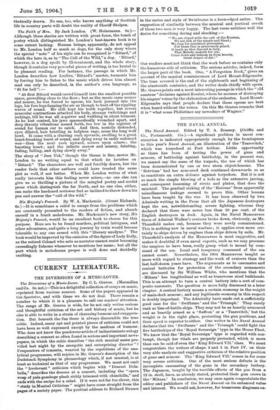The Faith of Men. By Jack London. (W. Heinemann. 6s.)—
Although these stories are written with great force, the touch of poetry which distinguished 3f.r. London's best-known book is to some extent lacking. Human beings, apparently, do not appeal to Mr. London half so much as dogs, for the only story where the special "note" of his style can be recognised is " Biltard," of which the hero is, as in "The Call of the Wild," a dog. 'Biltard,' however, is a dog spoilt by ill-treatment, and the whole story, though it contains very powerful pieces of writing, is too brutal to be pleasant reading. For instance, the passage in which Mr. London describes how Leder% `Bittard's ' master, torments him by forcing him to listen to the music which drives him almost mad can only be described, in the author's own language, as "fit for hell": —
"At first Bitard would crowd himself into the smallest possible space, grovelling close to the floor ; but as the music came nearer and nearer, he was forced to uprear, his back jammed into the logs, his fore legs fanning the air as though to beat off the rippling waves of sound. He still kept his teeth together, but severe muscular contractions attacked his body, strange twitchings and jerking% till he was all a-quiver and writhing in silent torment. As he lost control, his jaws spasmodically wrenched apart, and deep throaty vibrations issued forth, too low in the register of sound for human ear to catch. And then, nostrils distended, eyes dilated, hair bristling in helpless rage, arose the long wolf howl. It came with a slurring rush upwards, swelling to a great heart-breaking burst of sound, and dying away in sadly cadenced woe—then the next rush upward, octave upon octave ; the bursting heart ; and the infinite sorrow and misery, fainting, fading, falling, and dying slowly away."
The story of " Jees Uck," though the theme is fine, moves Mr. London to no writing equal to that which he lavishes on Bitard." The characters are well and forcibly drawn, but the reader feels that other authors could have treated the same plot as well, if not better. When Mr. London writes of what really interests him this feeling never arises,—no one else can give us so thrilling a picture of the mingled poetry and sordid prose which distinguish the far North, and no one else, either, can make the hardened reviewer feel so inclined to throw down his pen and answer the "call of the wild."


























































 Previous page
Previous page